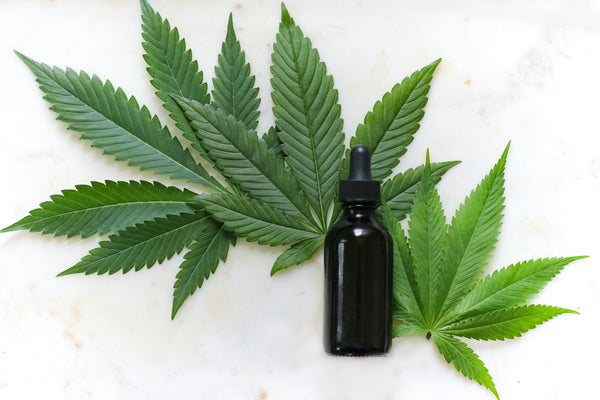The Benefits of CBD Oil for Dogs with Hip Dysplasia

Hip dysplasia is a common condition that affects many dogs, causing pain and discomfort in their hip joints. If your furry friend is experiencing hip dysplasia, you may be searching for effective treatments to alleviate their symptoms and improve their quality of life. One potential solution that has gained attention in recent years is CBD oil. This natural supplement has shown promise in providing relief for dogs with hip dysplasia, offering a range of benefits that can make a significant difference in their overall well-being.
Related: Why is My Dog Bleeding From His Private Part?
Understanding Dog Hip Dysplasia
Hip dysplasia is a musculoskeletal disorder that primarily affects large and giant breed dogs. It occurs when the hip joint doesn't develop properly, leading to an abnormal formation of the ball and socket. This misalignment can result in a loose and unstable joint, causing pain, inflammation, and limited mobility in affected dogs.
When a dog is diagnosed with hip dysplasia, it can be a challenging and distressing time for both the dog and their owner. Understanding the causes, risk factors, and management strategies for this condition is crucial in providing the best possible care for your furry friend.
Exploring the Causes of Hip Dysplasia in Dogs
Several factors contribute to the development of hip dysplasia in dogs. One of the primary causes is genetics. Certain breeds are more prone to this condition, and if an affected dog is bred, the likelihood of passing it on to their offspring increases.
However, it's important to note that genetics alone do not determine the development of hip dysplasia. Environmental factors can also play a significant role. Rapid growth, excessive exercise, obesity, poor nutrition, and improper breeding practices can all contribute to the manifestation of this condition.
For example, puppies that grow too quickly are at a higher risk of developing hip dysplasia. Their bones may not have enough time to properly form, leading to an increased likelihood of joint abnormalities. Similarly, dogs that are overweight or obese put additional stress on their joints, exacerbating the symptoms of hip dysplasia.
The Role of Genetics in Dog Hip Dysplasia
Genetics play a significant role in determining a dog's susceptibility to hip dysplasia. Breeds such as German Shepherds, Labrador Retrievers, and Golden Retrievers are known to have a higher risk of developing this condition. However, it's important to remember that any dog, regardless of breed, can be affected.
Responsible breeders understand the importance of screening for hip dysplasia in their breeding dogs. By conducting hip evaluations and only breeding dogs with healthy hips, they can help reduce the prevalence of this condition in future generations. Genetic testing can also be a valuable tool in identifying dogs at risk for hip dysplasia.
Furthermore, it's worth noting that even if a dog has a genetic predisposition to hip dysplasia, proper care and management can significantly improve their quality of life. Regular exercise, weight management, and joint supplements can all contribute to minimizing the impact of this condition.
The Impact of Nutrition on Hip Dysplasia
Nutrition plays a crucial role in the overall health of dogs, and it can also influence the severity of hip dysplasia symptoms. Providing a balanced diet that includes essential nutrients, vitamins, and minerals is essential for maintaining your dog's joint health and minimizing the progression of hip dysplasia.
Feeding a high-quality dog food that is specifically formulated for joint health can be beneficial for dogs with hip dysplasia. These foods often contain ingredients such as glucosamine and chondroitin, which can help support joint function and reduce inflammation.
In addition to a balanced diet, maintaining a healthy weight is vital for dogs with hip dysplasia. Excess weight puts additional stress on the joints, worsening the symptoms and progression of the condition. Working with your veterinarian to develop a weight management plan tailored to your dog's needs can make a significant difference in their overall well-being.
It's important to consult with a veterinarian if you suspect your dog may have hip dysplasia or if you have any concerns about their joint health. Early detection and appropriate management strategies can help improve your dog's comfort and mobility, allowing them to live a happy and active life.
Related: Can Dogs Eat Scallops?
Recognizing the Signs of Hip Dysplasia in Your Dog

Detecting hip dysplasia in dogs can sometimes be challenging, as the symptoms can vary in severity. However, knowing the signs to look out for can help you identify the condition early and seek appropriate treatment for your four-legged companion.
Some of the typical signs of hip dysplasia in dogs include:
- Lameness or limping
- Difficulty rising or standing up
- Reluctance to jump or climb stairs
- Pain or discomfort when touched around the hip area
- Loss of muscle mass in the hind legs
If you notice any of these signs in your dog, it is crucial to consult with your veterinarian for a proper diagnosis and treatment plan.
Hip dysplasia is a common orthopedic condition that affects many dogs, particularly large and giant breeds. It is a developmental disorder of the hip joint, where the ball and socket do not fit together properly. This can lead to joint instability, pain, and eventually, arthritis.
When a dog has hip dysplasia, they may experience lameness or limping. This is often more noticeable after exercise or prolonged periods of rest. The dog may also have difficulty rising or standing up, as the hip joint becomes stiff and painful. Jumping or climbing stairs may become challenging for the dog, as they try to avoid putting too much weight on their affected hip. Additionally, touching the hip area may cause the dog to react with pain or discomfort.
As hip dysplasia progresses, the dog may start to lose muscle mass in their hind legs. This is because they are using those muscles less due to the pain and discomfort in their hips. The loss of muscle mass can further exacerbate the lameness and make it even more difficult for the dog to move around comfortably.
If you suspect that your dog may have hip dysplasia, it is essential to consult with your veterinarian. They will perform a thorough physical examination and may recommend further diagnostic tests, such as X-rays, to confirm the diagnosis. Treatment options for hip dysplasia can vary depending on the severity of the condition, but they often include pain management, physical therapy, weight management, and in severe cases, surgery.
Prevention is always better than cure when it comes to hip dysplasia. While the condition has a genetic component, there are steps you can take to reduce the risk in your dog. Providing a balanced diet and maintaining a healthy weight can help minimize the strain on the hip joints. Regular exercise, particularly low-impact activities like swimming, can help strengthen the muscles around the hips and improve overall joint health. Additionally, avoiding excessive jumping or activities that put excessive stress on the hips can also help prevent the development or progression of hip dysplasia.
In conclusion, recognizing the signs of hip dysplasia in your dog is crucial for early detection and appropriate treatment. By being aware of the symptoms and taking preventive measures, you can help ensure your furry friend's hip health and overall well-being.
Related: Exploring Options: A Guide to Open Farm Dog Food
Effective Treatments for Dog Hip Dysplasia

When it comes to managing hip dysplasia in dogs, several treatment options are available. The choice of treatment depends on the severity of the condition and the individual needs of your furry friend. Below are some common approaches to managing hip dysplasia:
Conservative Approaches to Managing Hip Dysplasia
For mild cases of hip dysplasia, conservative approaches can help alleviate symptoms and improve your dog's quality of life. These approaches may include weight management, controlled exercise, physical therapy, and the use of assistive devices such as ramps or orthopedic beds.
Medication Options for Hip Dysplasia Relief
In more severe cases, your veterinarian may recommend medications to help reduce pain and inflammation associated with hip dysplasia. Non-steroidal anti-inflammatory drugs (NSAIDs), analgesics, and joint supplements are among the medications commonly used to manage symptoms and improve mobility.
Surgical Interventions for Severe Hip Dysplasia
In cases where conservative treatments are not sufficient, surgical interventions may be necessary. Surgical options for hip dysplasia include total hip replacement, femoral head ostectomy, and triple pelvic osteotomy. These procedures aim to improve joint stability, relieve pain, and restore your dog's ability to move freely.
Managing Weight to Alleviate Hip Dysplasia Symptoms
Weight management plays a crucial role in managing hip dysplasia in dogs. Excess weight puts additional stress on the affected joints, exacerbating the pain and discomfort. Maintaining a healthy weight through a balanced diet and regular exercise can help reduce symptoms and improve the overall well-being of your furry friend.
The Potential Benefits of CBD Oil Supplements for Hip Dysplasia
One option that has gained popularity in recent years is CBD oil supplements. CBD, or cannabidiol, is a non-psychoactive compound derived from the hemp plant. It has been found to have various therapeutic properties, including anti-inflammatory and analgesic effects that can benefit dogs with hip dysplasia.
CBD oil works by interacting with the endocannabinoid system in the body, which plays a role in regulating pain, inflammation, and immune function. By activating these receptors, CBD oil may help reduce pain and inflammation, improve joint mobility, and enhance your dog's overall comfort.
Related: Why Is My Senior Dog Drinking So Much Water?
Unveiling the Benefits of CBD Oil for Dogs

CBD oil offers a range of potential benefits for dogs beyond managing hip dysplasia symptoms. Some of the advantages of incorporating CBD oil into your dog's daily routine include:
Relieving Pain and Inflammation with CBD Oil
Pain and inflammation are common in dogs with hip dysplasia. CBD oil can help alleviate these symptoms by interacting with the receptors involved in pain modulation and reducing inflammatory responses in the body. This can provide your dog with much-needed relief and improve their overall well-being.
Strengthening Joint Muscles with CBD Oil
In addition to pain relief, CBD oil may also help strengthen the muscles supporting the affected joints. By reducing inflammation and promoting muscle recovery, CBD oil can contribute to improved joint stability and mobility in dogs with hip dysplasia.
Providing Comfort through CBD Oil Treats
Administering CBD oil to dogs can be made easier and more enjoyable with the use of CBD oil treats. These treats are infused with CBD oil and come in various flavors that dogs love. They provide a convenient and tasty way to incorporate CBD into your dog's daily routine, promoting consistent results in managing hip dysplasia symptoms.
In conclusion, CBD oil supplements offer a promising solution for dogs with hip dysplasia. By providing relief from pain and inflammation, promoting joint strength, and improving overall comfort, CBD oil can enhance the quality of life for dogs struggling with this condition. If your furry friend is experiencing hip dysplasia, consult with your veterinarian to determine if CBD oil supplements are suitable for their needs. With proper guidance and monitoring, CBD oil can be a valuable addition to your dog's treatment plan, helping them live a happier and more comfortable life.


















